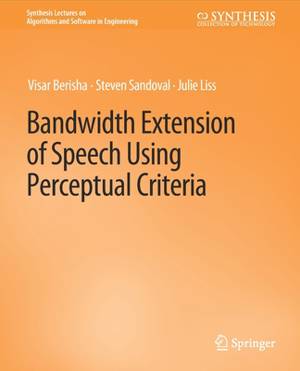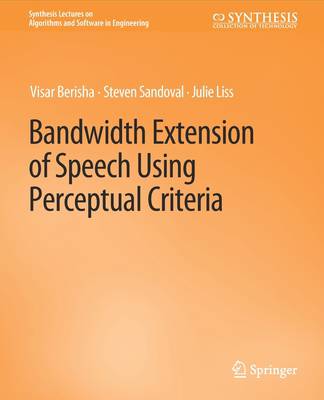
- Afhalen na 1 uur in een winkel met voorraad
- Gratis thuislevering in België vanaf € 30
- Ruim aanbod met 7 miljoen producten
- Afhalen na 1 uur in een winkel met voorraad
- Gratis thuislevering in België vanaf € 30
- Ruim aanbod met 7 miljoen producten
Zoeken
€ 45,95
+ 91 punten
Uitvoering
Omschrijving
Bandwidth extension of speech is used in the International Telecommunication Union G.729.1 standard in which the narrowband bitstream is combined with quantized high-band parameters. Although this system produces high-quality wideband speech, the additional bits used to represent the high band can be further reduced. In addition to the algorithm used in the G.729.1 standard, bandwidth extension methods based on spectrum prediction have also been proposed. Although these algorithms do not require additional bits, they perform poorly when the correlation between the low and the high band is weak. In this book, two wideband speech coding algorithms that rely on bandwidth extension are developed. The algorithms operate as wrappers around existing narrowband compression schemes. More specifically, in these algorithms, the low band is encoded using an existing toll-quality narrowband system, whereas the high band is generated using the proposed extension techniques. The first method relies only on transmitted high-band information to generate the wideband speech. The second algorithm uses a constrained minimum mean square error estimator that combines transmitted high-band envelope information with a predictive scheme driven by narrowband features. Both algorithms make use of novel perceptual models based on loudness that determine optimum quantization strategies for wideband recovery and synthesis. Objective and subjective evaluations reveal that the proposed system performs at a lower average bit rate while improving speech quality when compared to other similar algorithms.
Specificaties
Betrokkenen
- Auteur(s):
- Uitgeverij:
Inhoud
- Aantal bladzijden:
- 71
- Taal:
- Engels
- Reeks:
Eigenschappen
- Productcode (EAN):
- 9783031003936
- Verschijningsdatum:
- 13/11/2013
- Uitvoering:
- Paperback
- Formaat:
- Trade paperback (VS)
- Afmetingen:
- 190 mm x 235 mm
- Gewicht:
- 158 g

Alleen bij Standaard Boekhandel
+ 91 punten op je klantenkaart van Standaard Boekhandel
Beoordelingen
We publiceren alleen reviews die voldoen aan de voorwaarden voor reviews. Bekijk onze voorwaarden voor reviews.








